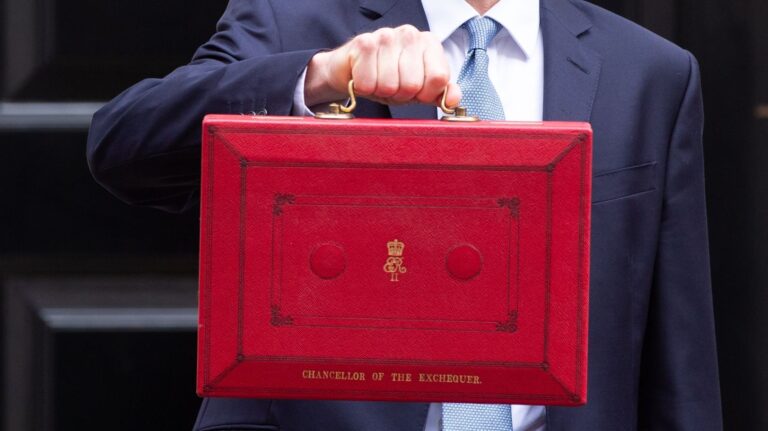UK prime minister Rishi Sunak claimed that the UK economy is getting “on the right track”, while visiting a new logistics hub under construction in Swindon, Wiltshire.
The scheme is being built on the site of a former Honda car production plant in Swindon that was closed in July 2021, after being in operation for 36 years. 3,000 jobs were reportedly lost as a result of the plant’s closure.
European industrial and logistics developer Panattoni purchased the 370-acre site and plans to develop a logistics hub to be known as Panattoni Park Swindon, which will ‘total 7.2 million ft², with a range of unit sizes available on both a speculative and build-to-suit basis’.

Targeting EPC ‘A’ rating for its warehouses, the site is set to benefit from sustainability features such as roof-mounted solar photovoltaics (PV), rainwater harvesting, sensor lights and water leak detection.
Do you want to find out more about the latest trends and issues within the industrial and logistics property sector?
Register now for Logistics Manager’s Industrial & Logistics Property Conference, taking place on 15 May 2024 at 30 Euston Square, London!
Addressing the press and Panattoni staff at the Swindon site, Sunak said: “In just the last five years, [Panattoni has] begun developing more than 25m ft² of new industrial space across the country and that is huge for the UK economy, just as the investment right here is a very big deal for Swindon and the local area.
“I think that’s a huge vote of confidence in the UK and it show that the work we’re doing to get the economy on the right track is paying off”.
This comes just days before chancellor Jeremy Hunt is set to unveil the highly-anticipated Spring Budget.
On 4 March, Hunt announced a £360m investment package in the UK’s life sciences and manufacturing sectors, as part of the government’s plan to ‘grow the economy, boost health resilience and support jobs across the UK’.
Amongst those set to benefit from this funding are two pharmaceutical companies, Almac and Ortho Clinical Diagnostics, due to receive £7.5m to expand their manufacturing plants in the UK.
In the 2023 Autumn Statement, Hunt set out plans to make a total of £4.5 billion of funding available to the automotive, aerospace, life sciences and clean energy sectors over the course of five years, beginning in 2025.
The chancellor also announced an increase of up to £120m to the Green Industries Growth Accelerator (GIGA) on 4 March. The government has confirmed that this fund has now increased to almost £1.1bn and says that the new funding is to ‘further support expansion of low-carbon manufacturing supply chains across the UK, lowering costs and accelerating the transition’.
In response to the announcement of the £360m government investment package, Stephen Phipson, CEO of Make UK, said: “Industry will welcome this announcement as yet another boost for key sectors that will put advanced manufacturing at the heart of the UK’s economic future.
“These industries will be key to addressing many of the societal challenges we face in a competitive world and highlight what can be achieved with a constructive dialogue between government and business.
“Taken together they are another piece in the jigsaw of a modern industrial strategy to make the UK a world leader in key sectors of the future.”
Sectors such as logistics and transport are likely to rely somewhat on government funding in order to navigate challenges such as increased costs and the transition to net zero.
Ahead of the Spring Budget announcement, CEO of the Institute of the Motor Industry (IMI) Steve Nash commented: “Although the government made the decision last September to move the deadline back to 2035 for the ban on the sale of new petrol and diesel vehicles, the passing of the ZEV mandate into law this January means that many businesses that operate in the automotive aftermarket still need to be EV-ready if they want to be part of the road to zero.
“Yet they are faced with significant costs for equipment and training and little immediate incentive in the form of customer demand.
“If the government is genuinely committed to reducing carbon emissions it not only needs to stimulate the market; it also needs to ensure the aftermarket sector is adequately equipped and trained to support EV drivers.
“We, therefore, hope that the Treasury is giving serious consideration to reinstating the super-deduction (130% first-year capital allowance for qualifying plant and machinery assets and 50% first-year allowance for qualifying special rate assets) as well as reducing rates to help motor businesses invest in equipment and skills for new technologies.
“The full expensing 100% first-year capital allowance for qualifying plant and machinery assets introduced in March 2023 really doesn’t go far enough.”
For more on electric vehicles in the logistics sector and a Q&A with the House of Lords Environment and Climate Change Committee’s Baroness Parminter discussing the government’s EV policies, check out this feature in the March issue of Logistics Manager!
With big names from high-street retailers like Wilko to logistics firms like Tuffnells having gone into administration in the past 12 months, it is no surprise that all eyes are turned towards the Spring Budget announcement on 6 March. Funding will be vital in encouraging the growth of the logistics sector and the prosperity of organisations in the face of economic headwinds.
Keep an eye out on the Logistics Manager website and the April issue for more coverage of the Spring Budget in the days and weeks to come.
IntraLogisteX is coming back to the NEC, Birmingham on 19-20 March 2024, co-located with Robotics and Automation, plus the new Sustainable Supply Chain Exhibition. Click here to find out more about all three exhibitions and register for this unmissable event!







